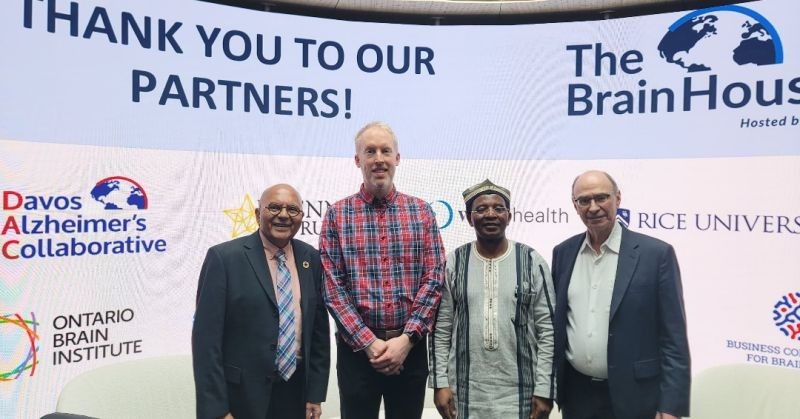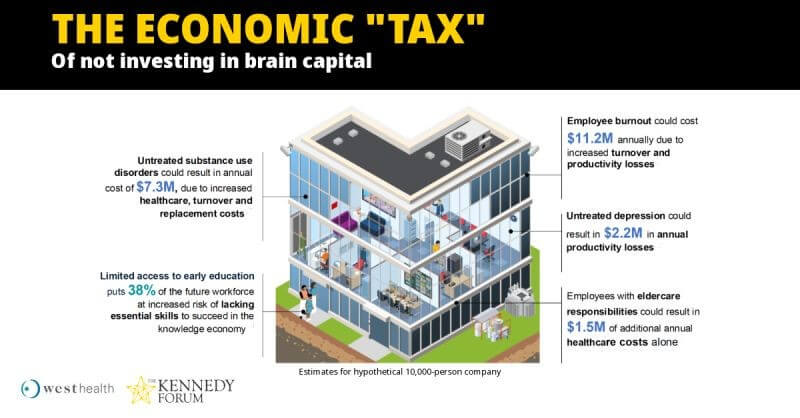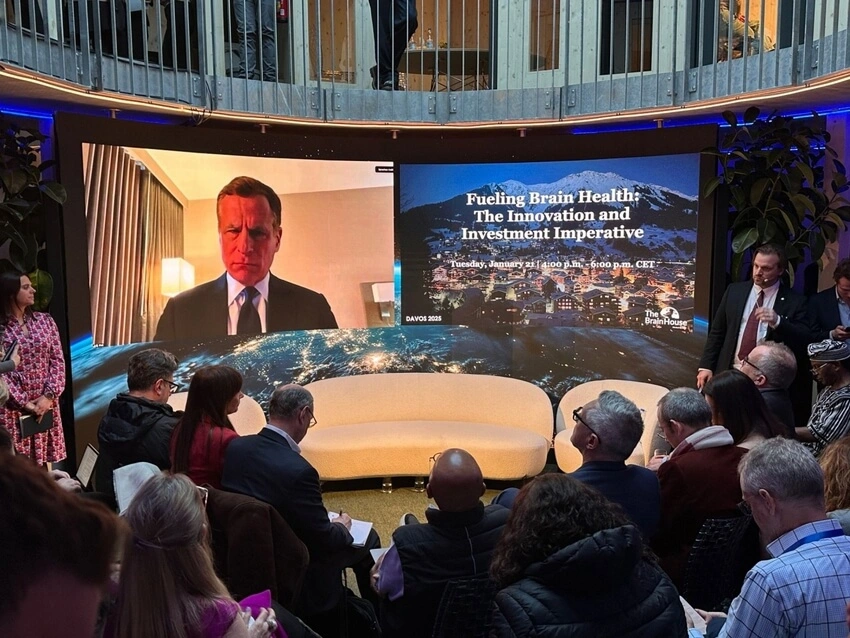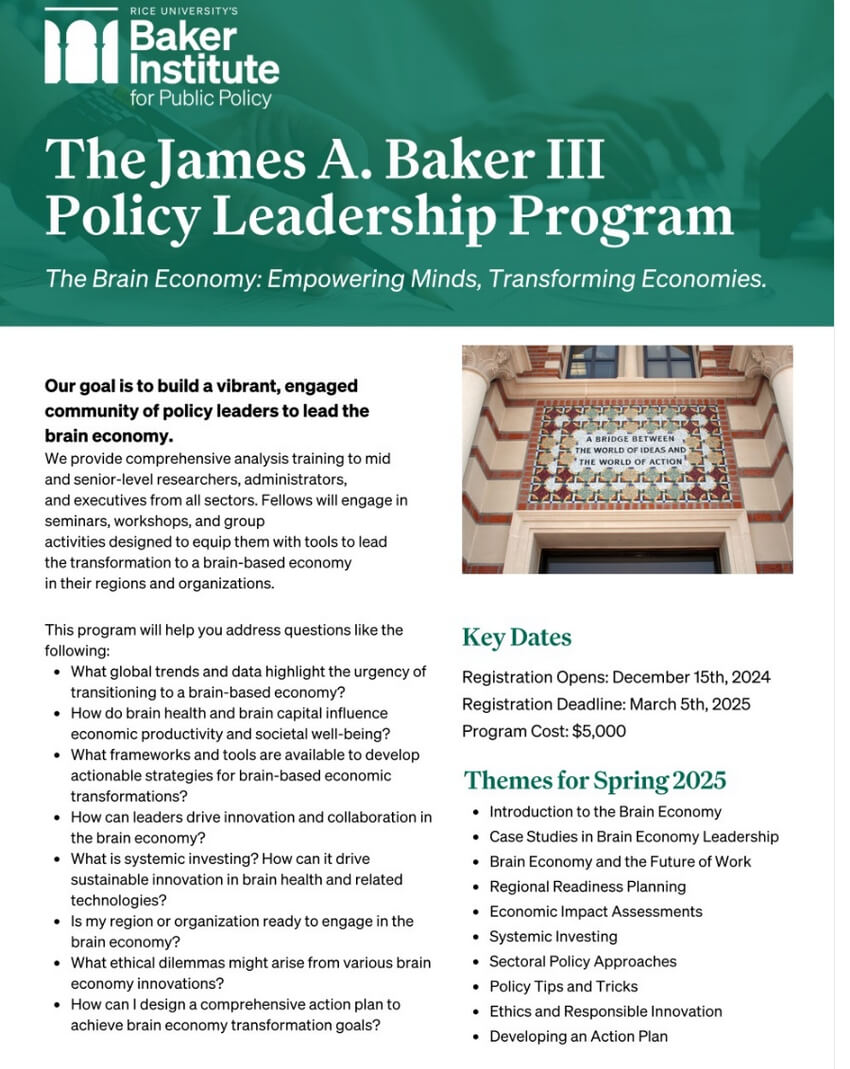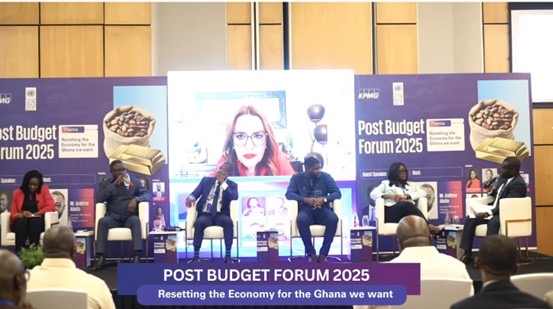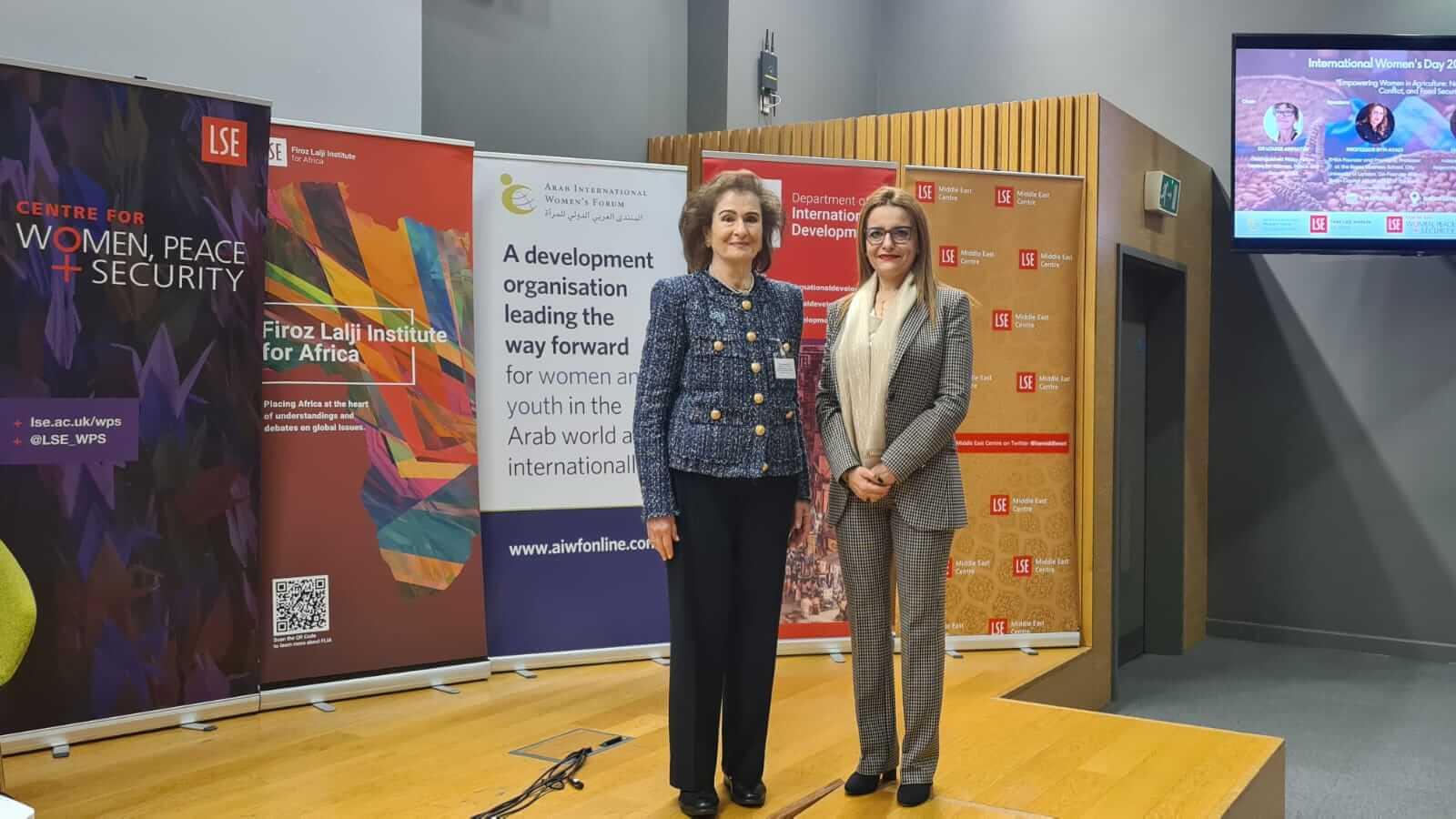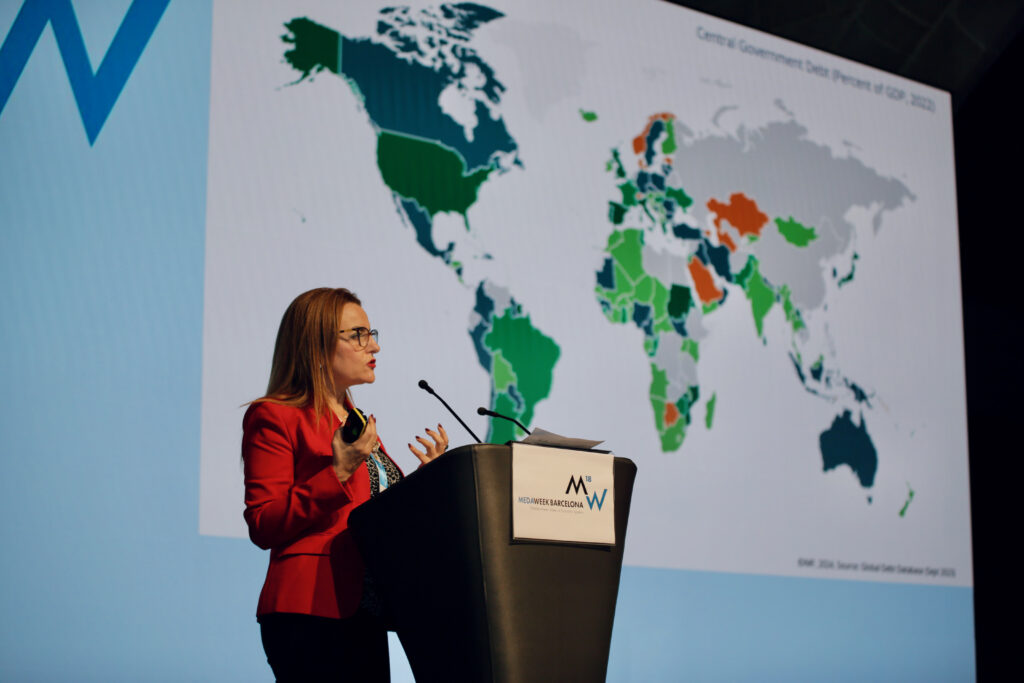EMEA Advisor, Dr. Harris Eyre, lead and senior fellow in neuro-policy with Rice University’s Baker Institute for Public policy and executive Director of the Brain Capital Alliance, shared his top 10 reflections and forward-thinking ideas after attending the World Economic Forum 2025 in Davos:
-
- The brain transition has arrived: Andy Moose of the World Economic Forum noted at the final Brain House session that a WEF formal Workshop had been held on January 23rd titled, “The Brain Economy”. At the end of the Workshop, WEF announced a WEF/ McKinsey Health Institute Brain Economy Dialogue Series to be held globally over the next 12 months. See this wonderful MHI overview. A Forbes article was written on The Brain House titled “Brain Health Emerges as a Top Priority at Davos”. This progress is at breakneck speed given the first technical paper was published at the end of 2020 in Molecular Psychiatry and the first organization was launched quickly thereafter called the OECD – OCDE Neuroscience-inspired Policy Initiative (co-led with William Hynes a brilliant economist). We have come along way thanks to global actors linking arms and it’s only been 1 month since The Lancet Group Neurology called for brain health to move from side events to the main event – we have achieved this and now must sustain it.
- The brain transition has arrived: Andy Moose of the World Economic Forum noted at the final Brain House session that a WEF formal Workshop had been held on January 23rd titled, “The Brain Economy”. At the end of the Workshop, WEF announced a WEF/ McKinsey Health Institute Brain Economy Dialogue Series to be held globally over the next 12 months. See this wonderful MHI overview. A Forbes article was written on The Brain House titled “Brain Health Emerges as a Top Priority at Davos”. This progress is at breakneck speed given the first technical paper was published at the end of 2020 in Molecular Psychiatry and the first organization was launched quickly thereafter called the OECD – OCDE Neuroscience-inspired Policy Initiative (co-led with William Hynes a brilliant economist). We have come along way thanks to global actors linking arms and it’s only been 1 month since The Lancet Group Neurology called for brain health to move from side events to the main event – we have achieved this and now must sustain it.
- A focus on productivity and economic growth seems like the most impactful frame: These concerns are of major concern in G7 countries, particularly Canada, the United Kingdom and the European Union. The alarms around these economic challenges were sounded during WEF by many leaders. The brain transition is an integrated economic model to drive down the cost of mental and neurological disorders across the lifespan via better prevention, early identification, early intervention and treatments. The brain transition exposes brain health as a previously hidden lever which can boost creativity, analytical thinking and other brain skills which are vital to entrepreneurship, invention and innovation. It is likely we will need to move from DEI programs to brain health programs in workplaces. Shovel ready programs include the Business Collaborative for Brain Health ( Kelly O’Brien ) and BDC Entrepreneur Wellbeing Program ( Michael A. Freeman, M.D.). George Vradenburg Julian Karaguesian William Hynes Rym Ayadi Frédéric Destrebecq Professor Miranda Wolpert Jules Chappell OBE Jacqui Brassey, PhD, MA, MAfN (née Schouten) Michael A. Freeman, M.D. Rebecca O. Bagley Patrick J. Kennedy Garen Staglin Kate Newhouse, CMgr CCMI Cara Altimus Diane Ty Sarah Lenz Lock, JD
- We need to scale up brain ARPAs (advanced research projects agencies) like the Wyss Center for Bio and Neuroengineering : The further proliferation and scaling of these models in Europe were called for by the European Commission ’s Draghi Report on European Competitiveness. After spending time with Erwin Böttinger and Tracy Laabs, PhD bs you can see why. They appear to me to have the only dedicated brain ARPA in the world. There is ripe opportunity to fuel radical brain innovation by linking and accelerating entities like Wellcome Leap , AR+IA (UK Gov), Defense Advanced Research Projects Agency (DARPA) , Advanced Research Projects Agency for Health (ARPA-H) and the Wyss Center. Shiva Dustdar Paweł Świeboda Elizabeth Kuiper Frédéric Destrebecq Jacob Robinson Behnaam Aazhang Luay Nakhleh Amy Dittmar
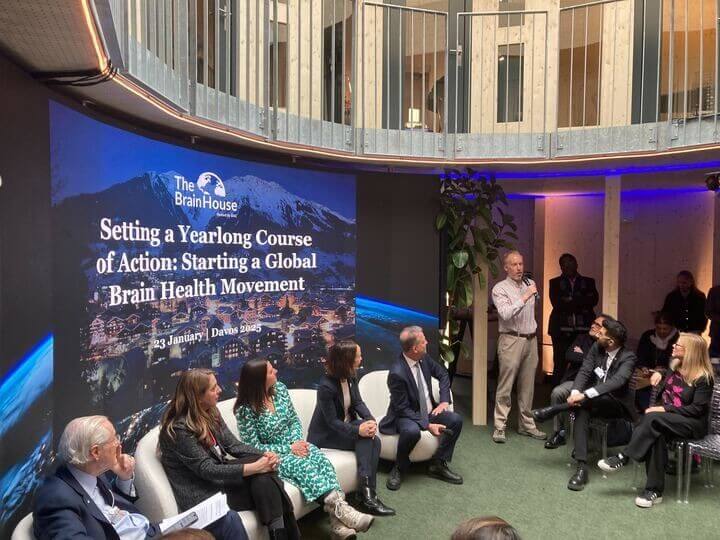
- We need to scale up national brain health plans: These are models that allow national actors across the brain area to connect and drive better research, innovation, public health, clinical care and workforce development such as via the Swiss Brain Health Plan ( Claudio Lino Bassetti Indrit Bègue) and Indian Government Brain Health Task Force ( Rajinder K Dhamija ) are inspiring and novel. How can we scale this up across nation states? Perhaps they will differ in each country but a toolkit would help. Shayla Smith A The Lancet Group and/or Nature Portfolio Commission on Brain Health seems timely. As the World Health Organization is being reassessed we must ensure citizens seek support and so private-philanthropic-academic collaborations can step up and step into the breech in the interim. Andrea Sylvia Winkler Sarbani Chakraborty Mitchell Elkind Zul Merali Prof. Alfred K. NJAMNSHI Tina Hjortlund Mika Pyykkö Kaisa Hartikainen Cyprian Mcwayizeni Mostert Agustin Ibanez Josefina Cruzat William Heisel
- The brain transition must stay high up on the main agenda: As we seem to have elevated these discussions to high for a over the past 6 months with a crescendo at WEF this week, we must work carefully with health, economics and financial experts to navigate systems like G7, G20, UNGA and the World Health Assembly. Miranda Wolpert Robin Nataf Jules Chappell OBE Katrin Seeher
- Public banks and development banks need to step in to help find return seeking and non return seeking approaches to drive the brain transition: As has been achieved in infectious diseases, we must work hard with financial institutions to think this through. More to come on this soon as we share more projects in development. Come to think of it, private financial institutions can of course step in too… how would one put $1 trillion to work? Robert Steven Kaplan Jim Yong Kim Dan Mannix Sanjiv Das Nathan Cook Drew Holzapfel Eric W. Bennett
- We must invest in the brain very broadly, including in city-scapes: Investing in the brain transition must include of course digital, drugs, devices, diagnostics, lifestyle therapy, new clinical models, but we must think about neuroscience-inspired built environments up to and including city scapes. Social determinants of brain health such as housing may account for 80% of prevention opportunities. For city scapes, JLL, HKS, Inc. Arup and Perkins&Will inspire in this regard. See this quote from a recent WEF paper from Cynthia Kantor of JLL “Designing high-performance workplaces for creative and complex work could be enhanced by AI-led insights from neuroscience or cognitive psychology on optimum working environments”. Ben Hamley Emmy-Lou Quirke Hala El khorazaty Debbie Beck, Ed.D., MPA, FACHA, Upali Nanda, PhD Julie Hiromoto, FAIA Rachel Meidl, LP.D., MEPM, M.Ed, CHMM Robert Hurd
- A brain transition systemic change lab must advance quickly: We announced last year at COP29 Azerbaijan our initial plans and design for such a lab which is modelled on the Bezos Earth Fund and World Resources Institute Systems Change Lab. We must get to work building this out and looking sector by sector for shifts, targets and indicators. Think early childhood, food systems, AI, women’s affairs, social media, labor markets etc. Lawrence Jones Euro-Mediterranean Economists Association – EMEA Brain Capital Alliance Brain Economy Hub Erika Crowell Valiant Richey Felice Jacka OAM Dariush Mozaffarian Boniface Kakhobwe Penny Dakin Ana Nieto John Bailey
- The Global Brain Capital Dashboard can accelerate national-level actors: This Dashboard has been developed with extensive expert inputs. As discussed this week in Davos, we can now go further to look for a singular number or index for each nation to drive investment and competition among national actors. Advanced data analytics are key. Tiago Fioravanti Zibecchi William Brinson Weeks, MD, PhD, MBA Agustin Ibanez Lucy Perez
- Swiss-Texas brain transition collaboration has massive potential: The Brain House at WEF proudly included major actors from Texas ( Rice University, The University of Texas Medical Branch ) and Switzerland (Swiss Brain Health Plan, Wyss Center). There appears to be good alignment and commitment from these two ecosystems of Texas and Switzerland. Texas is proud to see Dan Patrick, our Lt Gov, outline his ambition for a $3 B Dementia Prevention Institute of Texas, we have engaged chambers of commerce, we have a flourishing neuroengineering sector, and other great universities and actors. Of course, Elon Musk is now a Texan with passion for brain-computer interfaces, economics, and the Mars Mission (one of the major barriers to which are the mental and neurological challenges of long-distance space flight, as we studied recently). Switzerland has engaged chambers of commerce, major life science players ( Roche , Novartis ) and a commitment to excellence.
Key papers colleagues and I published during Davos include:
- “An Advocacy Agenda for the Human Brain: Moving from Brain Health to Brain Capital” in Circulation, an American Heart Association journal, with Mitchell Elkind, Chief Clinical Science Officer of AHA, and Cheryl Pegus , Board Member of AHA.
https://www.ahajournals.org/doi/abs/10.1161/CIRCULATIONAHA.124.073077?af=R - “Empowering the Global Brain Economy: Key Milestones of 2024 and the Road Ahead” via Euro-Mediterranean Economists Association – EMEA Brain Capital Alliance Brain Economy Hub with Upali Nanda, PhD A/Professor Jo-An Occhipinti (née Atkinson) Josefina Cruzat Mika Pyykkö Kaisa Hartikainen Jafri Malin Abdullah Paweł Świeboda Zul Merali Michael Berk Indrit Bègue Frédéric Destrebecq Tiago Fioravanti Zibecchi Rym Ayadi
https://euromed-economists.org/wp-content/uploads/2025/01/EMEA_Empowering-the-Global-Brain-Economy_compressed.pdf - “Advancing precision psychiatry and targeted treatments: insights from immunopsychiatry” in Brain, Behavior and Immunity.
https://pubmed.ncbi.nlm.nih.gov/39828008/ - “Transforming Sovereign Wealth to Mental Wealth – Norway’s Social Production Report” from the dynamo A/Professor Jo-An Occhipinti (née Atkinson)
https://www.braincouncil.eu/social-production-report-davos-2025/
If this work interests you, please join our world-first Brain Economy Executive Education Course to be held in Paris, April 7 to 10, 2025. We need a completely new workforce of experts to drive the above to bend the escalating multitrillion dollar cost and unlock more human potential for a brighter future.
EMEA President and CEPS Senior Advisor, Prof. Rym Ayadi highlighted: “At WEF Davos 2025, brain capital and the brain economy have taken center stage, highlighting the critical need to invest in our most valuable asset—our brains. As we navigate the twin challenges of the digital and green transitions, building resilient societies and inclusive economies demands a focus on brain health, advanced skills, and innovation. This is not just a policy imperative but a foundation for sustainable growth and global competitiveness.”
Link to the Brain Capital Alliance
Link to the Global Brain Capital Dashboard
Link to the Brain Economy Systems Change Lab


